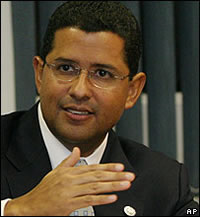
Francisco Flores, the former president of the Republic of El Salvador, visited campus Sept. 17-18 to meet with students and present a public lecture.
Francisco Flores will meet with students and lecture on ‘Making Small Nations Great through the Principles of Freedom’
The Policy Studies program, in conjunction with the Hispanic Chamber of Commerce of the Lehigh Valley, will host a two day visit by Francisco Flores, the former president of the Republic of El Salvador, Sept. 17-18. During his campus visit, Flores will meet with students to discuss economic and social policies he instituted to change El Salvador from a country identified with poverty and violence to an example of steady growth and human development.
Flores will present a public lecture, “Making Small Nations Great through the Principles of Freedom,” 7 p.m. Sept. 17, in the Williams Center for the Arts. On Sept. 18, he will attend a student luncheon in Pfenning Alumni Center with Policy Study majors and other select students.
In 1988, Flores was 29-years-old when he was elected to a cabinet post in El Salvador’s government. At the age of 36, he was president of congress and by the time he was 40, he was president of the country.
During his presidency, which lasted from 1999-2004, El Salvador went through an unprecedented reduction in poverty, had the highest level of public investment in the history of the country, and reduced the fiscal deficit which permitted the country to have the lowest interests rates and inflation in the last 25 years. All this was done in spite of the country suffering from two major earthquakes in less than 30 days in 2001 and recovering from decades of unrest due to civil war.
“The determinants of a nation’s living standards and the well-being of its citizens is a critical aspect of the Policy Studies curriculum. Which policies work and which polices fail is one of the major questions of our time,” says Mark Crain, William E. Simon Professor of Political Economy and chair of Policy Studies. “My goal is for Lafayette students to hear real-world experiences first hand from tested policymakers such as President Flores. Getting up close and personal with leaders such as President Flores emphasizes that studying these concepts is far more than a sterile academic exercise. President Flores faced intense challenges. The human stakes were tremendous in implementing the right policies. At that level of leadership, decision-makers must accept the responsibility for outcomes that last for decades and affect the well-being of millions. The Policy Studies Program is about how to get these decisions right.”
Born in El Salvador in 1959, Flores and his family left the country in 1977 because of rising tensions between the government and members of the communist movement. He spent six years in the United States, England, and India, and earned a degree in political science from Amherst College.
He returned to the country at the height of the civil conflict determined to make a change in his homeland through the political arena. Prior to ascending to the presidency, he became the youngest person in El Salvador’s history to hold the positions of secretary of communication, vice ministry of the presidency, vice ministry of planning, and coordinator of the social cabinet.
During his term, El Salvador became the principal advocate of Central American integration and Flores is considered to be the leader of this vision. He ended his presidency with more popular support (76 percent) than when he was elected (52 percent).
In the years following his presidency, Flores has founded the Am�rica Libre Institute, a non-profit think tank dedicated to creating and implementing public policy strategies for developing democratic nations.
“What we want students to learn are some of the policies behind the transformation and recovery in a country that was devastated by civil war and violence,” says Crain. “What are some of the specific things the government did to turn it around. This is really a great opportunity for students to find out about another part of the world.”
According to L�zaro Fuentes, founder and chairman of the Hispanic Chamber of Commerce of the Lehigh Valley, having Lafayette and the chamber work together to sponsor the Flores’ lecture goes a long way toward reaching greater cultural awareness in the student body and improving the students’ access to economic opportunities that exist in today’s global business environment. He feels that exposure to different cultures today can help prepare Lafayette’s students for the economic realities of tomorrow.
Fuentes says, “For members of the Hispanic Chamber of Commerce specifically, it is an opportunity to employ their language and cultural skills as ambassadors of Pennsylvania Business and Industry.”
Members of the chamber will also take part in a dinner with Flores prior to the lecture. Others in attendance will be Easton Mayor Phil Mitman, Allentown Councilman Julio Guridy, president of the Greater Lehigh Valley Chamber of Commerce Tony Iannelli, TV69 [in Spanish] newscaster Perla Lopez Baray, and TV69 [in Spanish] producer Jose Roman.
Flores’ visit is one of a number of events promoting Lafayette’s new Policy Studies major. Last fall, the program sponsored the College’s first ever, undergraduate-run election night television broadcast. In the spring, scholars, journalists, and policy makers from around the globe lectured on campus as part of Lafayette’s “Facing the Chinese Century: Prospects and Challenges” conference.
“The activities and programs we are sponsoring illustrate what majoring in Policy Studies is all about,” says Crain.
